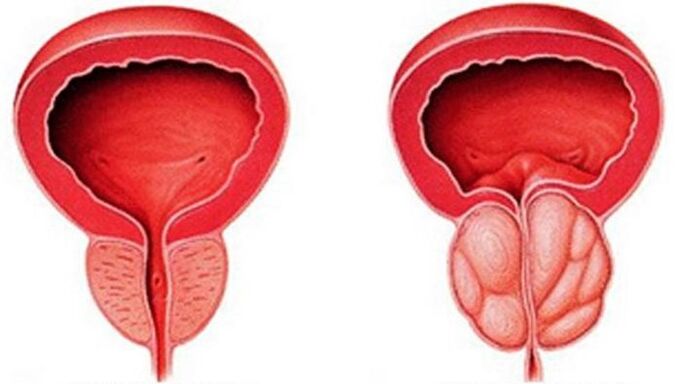Acute prostatitis is the most common disease in men. It is most commonly diagnosed between the ages of 30 and 50 in nearly 60% of the male population.
In the acute form of prostatitis, an inflammatory process develops in the prostate gland. Several groups of drugs are used to treat this stage of the disease, prostate massage and physiotherapy. The most important thing during treatment is to prevent the pathology from transitioning to a chronic form.
Acute prostatitis in men and its causes
Acute prostatitis is the development of an inflammatory process in the prostate gland caused by the penetration of an infection.
The disease is accompanied by swelling and purulence of the tissues of the prostate.
Among men, it is the most common illness, associated with disorders of sexual function and fertility, disorders of the psycho-emotional state, and social inadequacy.

Forms of acute prostatitis
The development of acute prostatitis goes through 4 stages, which simultaneously take the following forms:
- hurutos;
- follicular;
- parenchymal;
- abscess.
The disease begins with the development of catarrhal inflammation, which causes changes in the mucous and mucosal layers of the gland's secretory ducts. Edema of the canal wall causes stagnation of mucopurulent secretions in the prostate follicles. The inflammatory process begins to progress, causing focal abscesses in the lobes of the prostate gland. Acute follicular prostatitis develops.
Multiple damage to the lobes of the gland, structural changes in the tissues of the prostate, and the development of the purulent-inflammatory process in them lead to the next stage of the disease, parenchymal.
When many inflammatory foci merge into a large one, an abscess of the prostate is formed. It is possible to open into the urethra, perineum, rectum or bladder.
Causes of the disease
The following factors can cause acute prostatitis in men:
- Infectious processes in the urogenital system. Infectious agents (gram-negative and gram-positive) can penetrate prostate tissues: Escherichia coli, Proteus, staphylococci, streptococci. In many cases, the acute form of the disease can be caused by pathogens of urogenital infections, such as ureoplasmosis, chlamydia, mycoplasmosis, gonorrhea, candidiasis, and so on.
- Infectious processes that enter the urethra through the urethra. Microbes can enter prostate tissue through secretory channels that open into the urethra of the prostate gland. Therefore, in men, any type of cystitis is accompanied by acute prostatitis.
- Infectious processes that enter the gland with blood. The penetration of the infection into the prostate through the blood supply system is due to the widely developed arterial and venous fusion system. In this case, microbes are transported through the circulatory system from distant foci of purulent inflammation in diseases such as tonsillitis, tooth decay, sinusitis, bronchitis, cholecystitis, and others.
- Sedentary lifestyle. Due to low motor activity, stagnation of prostate juice occurs. This is facilitated by: long-term computer work, infrequent walks in the fresh air, smoking and drinking alcohol, infrequent sex, refusal to take active rest.
- Hypothermia. The long-term cold effects of the urinary system cause disruption of the blood supply, which also leads to stagnation of the prostate, leading to the development of acute prostatitis.
- Injuries to the pelvic organs and prostate. In the event of an injury, the release of prostate secretions is difficult, leading to an inflammatory process that subsequently causes acute prostatitis.
- Medical procedures. Acute forms of prostatitis can develop with chemotherapy or radiation therapy, and after medical examinations through the urethra.
Symptoms
The clinical picture of acute prostatitis is characterized by the following symptoms:
- Difficulty urinating
- feeling of incomplete emptying of the bladder;
- frequent urination;
- itching and burning;
- aching dull pain in the head of the penis that radiates to the anus (as the pathology develops, the pain becomes chronic);
- pain during defecation;
- increased body temperature (37-40 degrees - depending on the stage of the disease);
- decreased sexual desire;
- erection problems;
- content of pus and blood traces in the urine;
- deterioration of general well-being.
Treatment
Acute prostatitis, in contrast to the chronic form of the disease, responds well to therapy. Serious complications are very rare.
The most important task of medication is to get rid of the pathogen of pain syndrome and pathology, to restore the normal process of urination.
Medicines used in the medical treatment of acute prostatitis:
- Antibiotics The main class of drugs for the treatment of acute prostatitis. To select an antibiotic, your doctor must pinpoint the pathogen of the disease. Most often, a combination of antibiotics is prescribed when one drug is taken in one course and then replaced with another. This approach minimizes the development of re-inflammation and prevents the acute form of the disease from becoming chronic. They successfully use antibiotics - fluoroquinolones, tetracyclines, penicillins.
- Diuretics Diuretics are prescribed to facilitate the urination process and reduce stress. Diuretics promote regular and volumetric urination. Medicines and herbal diuretics are used.
- Antipyretic. They are used to lower body temperature and eliminate pain in the joints and head.
- Anticonvulsants. Medications that relax smooth muscles relieve cramps. In addition, medications in this group relieve pain and help with urination.
- Alpha blockers. Drugs that relieve seizures well stimulate and facilitate the removal of urine from the patient.
After removal of the main symptoms of the disease, prostate massage and physiotherapy procedures may also be prescribed.
You should lead a healthy lifestyle after recovery.
Properly selected treatment and adherence to all physician prescriptions will eliminate acute prostatitis and prevent it from becoming chronic.
































